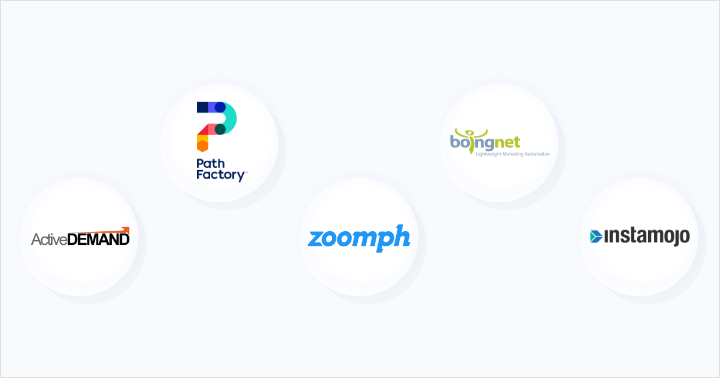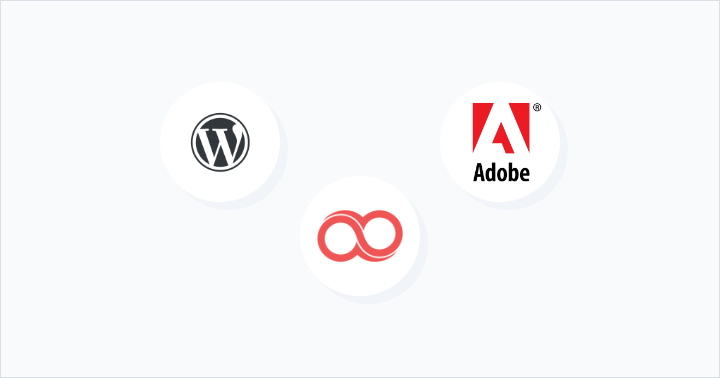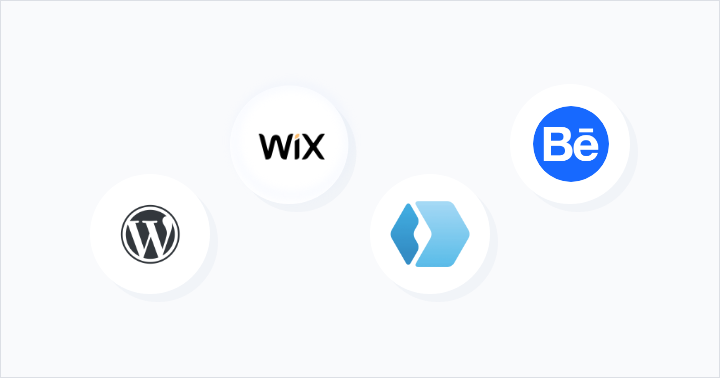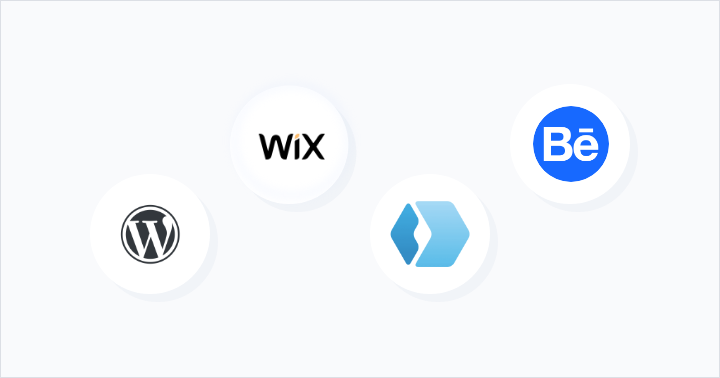Website design is crucial for any business to attract & engage with their visitors or customers.
Nearly 1.8 billion websites are running on search engines today to provide valuable content to their audience, and there are different types of websites available In the market.
Each website has a different design and type, which can confuse small businesses when deciding which will meet their needs.
As a designer or small business owner, it becomes vital to understand each website and its uses.
Generally, the type of website that fulfills your requirements depends upon your goals and brand story.
Build trust & FOMO
Highlight real-time activities like reviews, sales & sign-ups.
What is a Website?
It is a collection of interlinked web pages with a single domain name. It is a collection of texts, images, and videos and may include video, audio, or other media types.
Why Creating a Website Matters?
A website can make finding the products or services and information they need before purchasing easier.
A website helps you tell your brand story, engage with your customers, and provide in-depth value about the industry.
In short, without a website, you miss out on potential customers for your services.
To help you find the perfect website option as per your requirement, here’s a list of some popular types of websites on the web today:
Don’t Miss Out! Join Thousands Using WiserNotify to Increase Sales!
Boost Your Conversions with Social Proof Today
Types of Websites
1. E-commerce Website
E-commerce websites or online shopping websites help you to sell your products online.
The sites typically help sell products by making it easier for visitors to browse products, filter products by category, highlight special sales & offers, and make purchases with online payment options.
The easy way to build an e-commerce website is through full-solution platforms like Shopify, Magento, and Squarespace.
You or your team can easily update old products or list new products. On the product page, you can highlight images or videos of your products along with a description with more details.
Examples of such e-commerce websites are Apple and Adidas.
Which is the best E-commerce platform for you?

- Shopify: Beginners with any technical knowledge should build online stores.
- Big Commerce: It’s best for established businesses or big companies
- Wix: It is easy to build any website with a drag-and-drop option, especially for small online stores.
- Squarespace: It takes a little grab to build your website as it’s not beginner-friendly.
- Magento: It is recommended for large organizations with development teams to set up their e-commerce websites.
Also read: Top 10 Best E-Commerce Site Builders
2. Micro E-commerce Website
Micro-sites are single landing pages or small clusters of pages built for specific products or services.
It is like a mini-website for your brand’s content. They are built for specific audiences, enhance awareness about your products, and entice visitors with a specific CTA.
Microsites are used to build a small store with specific products or built by brands to target specific audiences or launch a new product or service.
Microsites allow brands to focus on what users are looking for. They are built only to attract audiences who are looking for a specific thing.
Examples of microsites: Adobe reshape the customer experience
Which is the best microsite platform for you?

- Active Demand: Build using a drag and drop website maker with built in marketing analytics and collaboration tools.
- Zoomph: Build the website using the drag-and-drop option with in-built layouts
- Boingnet: Need a little technical knowledge to build a microsite.
- Instamojo: Helps to build a site with the Instamojo payment suite and customize it easily.
3. Magazine Website or Online Magazines
A magazine website features articles, images, photos, and videos that provide information and education to visitors. The magazine industry has changed from a print platform to a digital platform.
The magazine website is designed exactly like magazines.
The magazines are also called e-magazines or electronic magazines, published online.
Many magazine publishers now provide digital reproductions of their offline magazines with some service fees.
Each article must have a similar layout and navigation.
The site must be responsive, as most people love reading content on mobile phones.
Examples of Magazine Websites are National Geographic, Newsweek, etc.
Which are the best platforms to build magazine websites?

- WordPress: Several magazine themes make it easier to customize your magazine website.
- Joomag: It’s a magazine publishing platform with tons of features & options for any publisher.
- Adobe DPS: It is a complete solution for creating, distributing, monetizing, and publishing content for tablets.
Must read: 9 Awesome Floating CTA Button Plugins for Your WordPress Website
4. Blogs
A blog website features consistent publishing of articles, photos, and videos.
Blogs provide more personal content than magazines.
Many websites publish blogs as a content marketing strategy to create awareness and engage with their audiences.
Providing valuable content to your audience increases the credibility of the company or an individual. Blogs also help to create personal branding.
Blogs can become more cumbersome for smaller companies that don’t have a marketing team and strategy to create unique content before launching the site.
Examples of blog websites are Hubspot, Moz, etc.
Which is the best platform to build a blog website?

- WordPress: Several themes make it easier to customize your magazine website.
- Wix: Customize your blog website with drag-and-drop options.
- Blogger: Free blogging service by Google. It provides an easy way to build your blog website without any coding knowledge.
- Tumblr: It is a microblogging website with social networking features.
5. Portfolio Website
Portfolio sites are crucial for freelancers working in the digital age.
At the same time, many freelancers hand out digital business cards. Other freelancers, like photographers, can distribute physical portfolios to potential clients.
A portfolio website allows freelancers in any industry to reach more clients globally.
It is a perfect site for artists, writers, designers, filmmakers, etc. to showcase their work.
In a portfolio, you must showcase your best work and not every project you worked on.
You can add unique layouts and features to make your portfolio attractive and creative.
Examples of portfolio websites are Leg Work Studio, Tim Smith, etc.
Which is the best platform to build your portfolio website?

- WordPress provides many themes and features to make your portfolio website unforgettable. (Free)
- Wix: It provides a free portfolio-building site with easy options.
- Behance: It is a beautiful place to build your online portfolio. ( Free)
- Portfolio Box: It is a paid platform to build an amazing and unique design of templates. It is the top choice to showcase your work.
Build trust & FOMO
Highlight real-time activities like reviews, sales & sign-ups.
6. Social Media Website
There are approximately 3.96 billion people on social media sites with several platforms available.
No matter who your target audience is, you’ll find them on one of these platforms: Facebook, Instagram, Snapchat, Linkedin, etc.
Although designing these platforms is impossible, you can create content to drive the audiences with social media shares.
You can build your social media accounts using the same logo design, colors, and information across all platforms.
Focus on the right thing to provide valuable content to your followers and expand your business.
Examples of social media pages or sites: Nutell’s Facebook page, etc.
Which is the best platform to build your social media sites?

- Facebook: With nearly 2.5 billion users worldwide, it is the largest social media site in the world to connect with your targeted audience.
- Instagram: The home for influencers, brands, bloggers, small businesses, and many more, with 1 billion users monthly.
- LinkedIn: The platform is mainly built for professionals looking to connect with other businesses or for B2B.
- Twitter: If your users are on this platform, they are more likely to engage with your content.
- YouTube: If you love to make video content, YouTube is the best side to scale up your business.
Also read: How to Add Social Media Follower Count on Your Website?
7. Directory & Listing Websites:
A directory & listing website lets users connect with other businesses locally or globally. The website works well when listing the businesses or people within an organization.
These websites list all the local or global businesses, including their names, addresses, phone numbers, and some information about the business.
For example, a local restaurant directory will include names, menus, phone numbers, price ranges, etc.
Examples of directory & listing websites are Google My Business, etc.
Which are the best platforms to build your directory & listing websites?

- BOTW: The Best of the Web is a trusted online directory with 40k to 60k visits per month in the U.S., trusted by 16 million businesses.
- Trip Advisor: Trip Advisor is a real pioneer in the travel-based directory website. It is famous for finding hotels & flights, the best platform to register if your hotelier or travel agency.
- City Square: City Square is the best directory for registering local businesses. Businesses can create their profile to reach local customers.
7. Educational Website
Educational website
s include different topics related to games, videos, or related sources to educate or enhance the skills of students or professionals.
These websites help to make the educational process easy, entertaining, and free to learn from anywhere.
This website supports different education sectors by providing relevant information and access to relevant data for each group served.
Types of Education sites:
- E-learning Portals
- Digital content serving sites
- School educational video websites
- Language learning sites
- Online courses sites
Examples of educational websites are Udemy, Unacademy, SkillShare, etc.
Which are the best platforms to build your educational websites?

- Teachable: It helps to build your online course or coaching services with unlimited students. It handles everything from web hosting to the payment process.
- Spayee: It is an all-in-one platform where you can create online courses with a fully functional website and app. With auto payment options for Indian payment gateways, inbuild live class and webinar platforms, and many more.
- Thinkific: It is a powerful platform to build online courses with excellent features such as personalized assignments, quizzes, and forums.
Also read 6 Steps To Increase The Traffic Of Your Online Coaching Website Quickly.
8. Forums
Online forums enable people to put their thoughts in front to discuss topics, ask questions, and interact with other users.
More and more websites are now beginning to include forums enabling users to discuss and talk with each other.
The sites are often built to provide information support and allow users to share their thoughts.
Forum websites often focus on a niche to help professionals, students, and like-minded people unite.
Examples of Forum websites are Quora, etc.
Which are the best platforms to build your forum website?

- Reddit: Even if it is an old-fashioned discussion forum, millions come here to discuss politics, post trending memes, post questions, and many more. It is best to register on the forum and share your thoughts.
- IGN: One of the largest gaming and entertainment community websites. It has now diversified and included movies and TV shows, too.
- Off-Topic: As the name suggests, it discusses all kinds of stuff. Unlike other communities specific to particular niches, it helps in discussions.
- Facebook Groups: Facebook group is one of the best places to build your forums, where your customers can discuss, post reviews, ask for help regarding any problem, etc.
9. Marketplace Website
Marketplace websites connect sellers with buyers. It’s often known as an electronic marketplace that manages everything from transactions and delivery to replacing items.
Marketplace helps small businesses reach out to potential customers who want to purchase products or services similar to yours.
The marketplace helps find all the products under one roof with different brands and multivendors.
The owner of the marketplace website is responsible for attracting customers and proceeding with transactions.
Examples of Marketplace websites are Amazon, Flipkart, eBay, etc.
Which is the best platform to build a marketplace website?

- Magento: The popular platform to build incredible websites with unique features & addons. The extensions help to build a powerful multivendor. Also, it offers fantastic extensions that increase sales.
- WooCommerce: It works side-by-side with WordPress, which means it has many themes, features, and plugins to build your website.
- BigCommerce: It is an excellent platform to build a multivendor marketplace. The unique functionality and various options help to manage your marketplace.
- Shopify is another popular platform for creating a powerful multivendor website with a drag-and-drop option.
10. Landing Pages
Landing pages are crucial in converting visitors to lead or change their minds to purchase the service/product with exciting offers they cannot reject.
It is different from other web pages in criteria. Also, landing pages require lots of focus on a keyword strategy, and a rank tracker can quicken this process.
- It has a form to collect visitors’ information in exchange for exciting offers.
- Its primary purpose is to convert visitors into leads. It includes an offer with a grabbing CTA.
You can also ask customers to fill out the form, enter their details, grab discounts or coupons, or even subscribe to an email list.
- Example of Landing Pages: Shopify, Muzzle,
etc.
Which is the best platform to build a Landing Page?

- Instapage: It helps to build a personalized, mobile responsive, and conversion-optimized post-clicking landing page. It helps to customize landing pages that convert visitors to lead fully.
- Unbounce: It helps to easily create and optimize your landing page for your small business and boost the conversion rate that promotes your visitors with only one goal.
- Landingi is another top landing page creation tool in the market today. It’s similar to Unbounce but has diverse features and functions.
Also read: 17 Landing Page Builder Software For Any Business
On the Final Note
Choosing the correct website that suits your industry, depending on your company’s mission, vision, and future goals, might be overwhelming.
To choose the right one, consider all the resources available to you.
For example, if you want to make money, making an eCommerce website to sell your product can help you, or making an education website to educate students or professionals with new skills can help you.
Once you figure out your goals and resources, try to do research with several templates and imagine the content with them.




